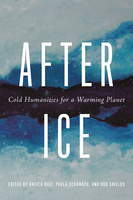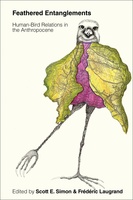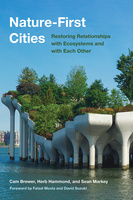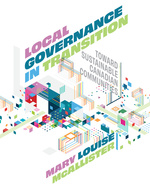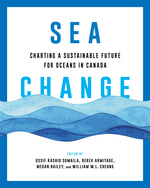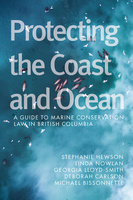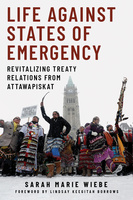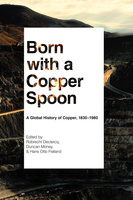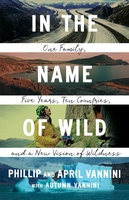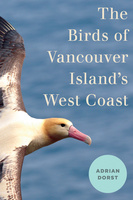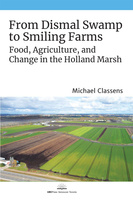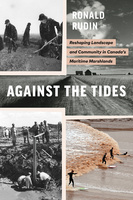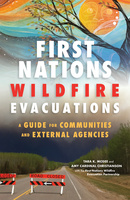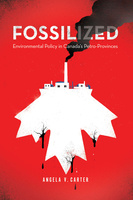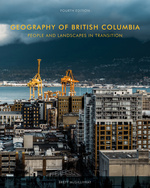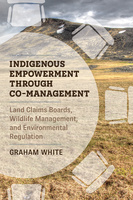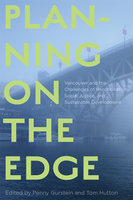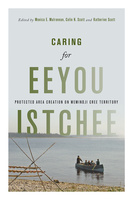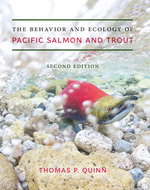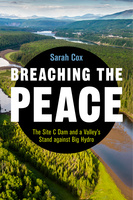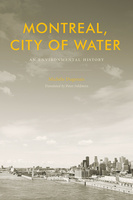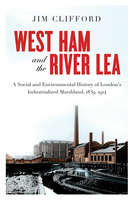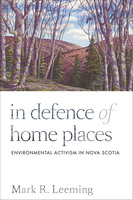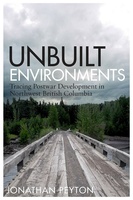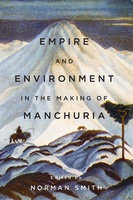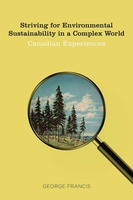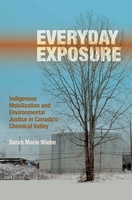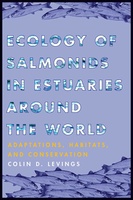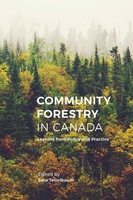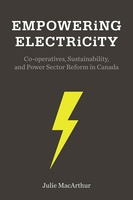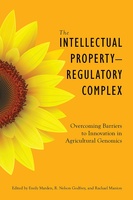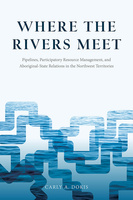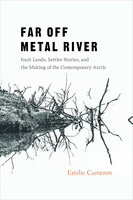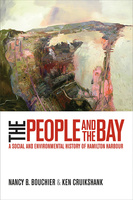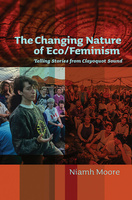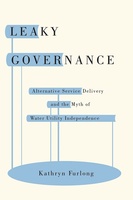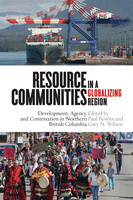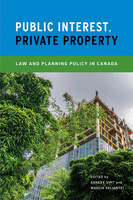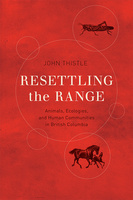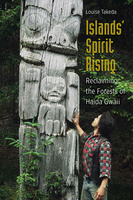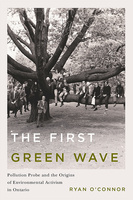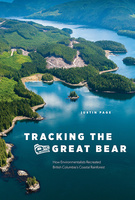Environmental Governance in the Gulf of St Lawrence
Environmental Governance in the Gulf of St. Lawrence provides guidance for enhancing the management of a vast and complex marine system.
Feathered Entanglements
Human-Bird Relations in the Anthropocene
Feathered Entanglements investigates human-bird relations across the Indo-Pacific and shows what birds can teach us about how to live with other species in the Anthropocene.
Nature-First Cities
Restoring Relationships with Ecosystems and with Each Other
Nature-First Cities recognizes nature as the lead architect in the most essential of restoration projects – our cities.
Local Governance in Transition
Toward Sustainable Canadian Communities
Local Governance in Transition presents a framework for conversations around technological, ecological, and economic challenges – and encourages innovative thinking for those interested in exploring sustainable solutions.
Sea Change
Charting a Sustainable Future for Oceans in Canada
Sea Change takes stock of what we know about Canada’s changing oceans, offering a wealth of practical information to support the task of building resilient, sustainable oceans and ocean communities.
Sustainable Energy Transitions in Canada
Sustainable Energy Transitions in Canada brings together experts from across the country to share their perspectives on how energy systems can respond to climate change, enhance social justice, respect local cultures and traditions – and still make financial sense.
Protecting the Coast and Ocean
A Guide to Marine Conservation Law in British Columbia
Protecting the Coast and Ocean, the first comprehensive guide to marine protection law in British Columbia, analyzes and compares the legal tools available to reverse ocean decline.
Life against States of Emergency
Revitalizing Treaty Relations from Attawapiskat
Life against States of Emergency responds to the central question Attawapiskat chief Theresa Spence asked in a high-profile ceremonial fast: What does it mean to be in a treaty relationship today?
Born with a Copper Spoon
A Global History of Copper, 1830–1980
Born with a Copper Spoon tells the fascinating and far-reaching story of one of the world’s most important metals.
In the Name of Wild
One Family, Five Years, Ten Countries, and a New Vision of Wildness
In the Name of Wild takes you on the five-year journey one family made across five continents to re-imagine the meaning of wildness.
The Birds of Vancouver Island’s West Coast
A detailed account of the 360 species of birds recorded on the wild west coast of Vancouver Island and its offshore waters.
From Dismal Swamp to Smiling Farms
Food, Agriculture, and Change in the Holland Marsh
From Dismal Swamp to Smiling Farms reveals how some of the most profitable farmland in Canada has been shaped, and ultimately imperilled, by liberal notions of progress and nature.
Against the Tides
Reshaping Landscape and Community in Canada’s Maritime Marshlands
Against the Tides tells the compelling story of the rehabilitation of the Maritime marshlands, a project that reshaped not only the landscape of the Bay of Fundy region but the communities that depended on it.
First Nations Wildfire Evacuations
A Guide for Communities and External Agencies
Based on the experiences of evacuees from seven First Nations communities, this book offers guidance to Indigenous communities and external agencies on how to successfully plan for and carry out wildfire evacuations.
The Government of Natural Resources
Science, Territory, and State Power in Quebec, 1867–1939
The Government of Natural Resources is a revealing look at how science can extend state power through territorial and environmental transformations.
Fossilized
Environmental Policy in Canada's Petro-Provinces
Fossilized reveals how Alberta, Saskatchewan, and Newfoundland and Labrador – blinded by exceptional economic growth from 2005 to 2015 – undermined environmental policies to intensify ecologically detrimental extreme oil extraction.
Geography of British Columbia, Fourth Edition
People and Landscapes in Transition
This extensively revised edition of Geography of British Columbia teaches students how to think like geographers as it takes them on a journey from the origins of the region’s diverse and unique landscapes to its more recent history as a province being reshaped by the forces of globalization.
Indigenous Empowerment through Co-management
Land Claims Boards, Wildlife Management, and Environmental Regulation
This book is a clear, compelling, and evidence-based assessment of the effectiveness of co-management boards in providing Indigenous peoples with genuine influence over land and wildlife decisions affecting their traditional territories.
Planning on the Edge
Vancouver and the Challenges of Reconciliation, Social Justice, and Sustainable Development
Planning on the Edge explores the reality behind the rhetoric of Vancouver’s reputation as a sustainable city and paves the way for developing Vancouver and its region into a place that is both economically sustainable and socially just.
Caring for Eeyou Istchee
Protected Area Creation on Wemindji Cree Territory
In Caring for Eeyou Istchee, Indigenous and non-Indigenous partners reveal how protected area creation presents a powerful vehicle for Indigenous stewardship, biological conservation, and cultural heritage protection.
Vancouverism
This is the remarkable story, told by a key insider, about Vancouver’s dramatic transformation from a typical mid-sized North American city into an inspiring world-class metropolis celebrated for its liveability, sustainability, and vibrancy.
The Nature of Canada
These captivating reflections on the history of our environment and ourselves will make you think differently not only about Canada’s past but also about our future.
The Behavior and Ecology of Pacific Salmon and Trout, Second Edition
The Behavior and Ecology of Pacific Salmon and Trout combines in-depth scientific information and outstanding photographs and original artwork to fully describe the fish species that are so important to the Pacific Rim.
Birds of Nunavut
The first complete survey of the birds of Nunavut, this fully illustrated reference work identifies and documents the distribution, ecology, behaviour, and conservation of the species that live in and migrate through the territory.
Breaching the Peace
The Site C Dam and a Valley’s Stand against Big Hydro
Award-winning journalist Sarah Cox recounts the prolonged battle, led by farmers and First Nations, to stop the cripplingly expensive and environmentally irresponsible Site C dam.
Montreal, City of Water
An Environmental History
Montreal, City of Water investigates the development of the city over two centuries, tracing the relationship between the city’s inhabitants and the waterways that ring its island and flow beneath it in underground networks.
West Ham and the River Lea
A Social and Environmental History of London’s Industrialized Marshland, 1839–1914
This original account of industrial London’s expansion into West Ham’s suburban marshlands highlights how pollution, poverty, and water shortages fuelled social democracy in Greater London.
In Defence of Home Places
Environmental Activism in Nova Scotia
In Defence of Home Places examines the diversity of environmental activism in Nova Scotia, placing its early social and legislative successes and eventual weakening and division within a national and international framework.
Unbuilt Environments
Tracing Postwar Development in Northwest British Columbia
This book looks at the long-term social and environmental effects of imagined, abandoned, and failed resource-development schemes in northwest British Columbia.
Empire and Environment in the Making of Manchuria
This unique analysis of Manchuria’s environmental history provides an overview of the climatic and imperialist forces that have shaped an area of ongoing geopolitical importance.
Striving for Environmental Sustainability in a Complex World
Canadian Experiences
In the face of growing anxiety about the environmental sustainability of the world, George Francis, a leading authority in the field of sustainability studies, examines initiatives undertaken in Canada over the past twenty-five years to protect some of our unique environments.
Everyday Exposure
Indigenous Mobilization and Environmental Justice in Canada’s Chemical Valley
Everyday Exposure documents the adverse health effects experienced by Aamjiwnaang citizens in the heart of Canada’s Chemical Valley and argues for a transformative and experiential “sensing policy” approach that takes the voices and experiences of Indigenous citizens seriously.
Ecology of Salmonids in Estuaries around the World
Adaptations, Habitats, and Conservation
A comprehensive guide to understanding the crucial role estuaries play in the salmonid life cycle and what can be done to conserve – and recover – this important fish habitat.
Community Forestry in Canada
Lessons from Policy and Practice
The first comprehensive look at community forestry initiatives across Canada, this book provides a rich and detailed portrait of the sector from Newfoundland to British Columbia.
Empowering Electricity
Co-operatives, Sustainability, and Power Sector Reform in Canada
This revealing analysis of Canada’s electrical power co-operatives challenges our understanding of their history and shines a light on their potential within the nation’s electricity sector.
The Intellectual Property–Regulatory Complex
Overcoming Barriers to Innovation in Agricultural Genomics
This book offers a pathway forward for innovation in agricultural genomics by identifying and addressing the significant obstacles posed by conflicting intellectual property and biosafety regimes.
Where the Rivers Meet
Pipelines, Participatory Resource Management, and Aboriginal-State Relations in the Northwest Territories
An examination of Sahtu Dene participation in the assessment of the Mackenzie Gas pipeline and other resource extraction projects, this book provides an in-depth account of the workings and effects of participatory environmental assessment in the Canadian North and its implications for the legitimization of resource co-management.
Far Off Metal River
Inuit Lands, Settler Stories, and the Making of the Contemporary Arctic
Drawing on the story of the 1771 Bloody Falls massacre, human geographer Emilie Cameron explores the relationship between stories and colonialism, challenging readers to examine their perceptions of the contemporary Arctic and its peoples.
The People and the Bay
A Social and Environmental History of Hamilton Harbour
This engaging history brings to life the personalities and power struggles that shaped how Hamiltonians used their harbour and, in the process, invites readers to consider how moral and political choices being made about the natural world today will shape the cities of tomorrow.
The Changing Nature of Eco/Feminism
Telling Stories from Clayoquot Sound
In its careful account of eco/feminist activism in Clayoquot Sound in the early 1990s, The Changing Nature of Eco/Feminism confounds prevailing stories about eco/feminism, feminism, and Clayoquot itself.
Leaky Governance
Alternative Service Delivery and the Myth of Water Utility Independence
Municipalities face important water supply challenges. One response has been to render utilities independent from municipal government through alternative service delivery. Both water management and municipal governance must be strengthened to meet contemporary water supply needs.
A Town Called Asbestos
Environmental Contamination, Health, and Resilience in a Resource Community
In A Town Called Asbestos, a mining town’s proud and painful history is unearthed to reveal the challenges a small resource community faced in a globalized world.
Resource Communities in a Globalizing Region
Development, Agency, and Contestation in Northern British Columbia
This book explores how the peoples and communities of northern British Columbia are responding to global demand for local resources.
Public Interest, Private Property
Law and Planning Policy in Canada
Through selected case studies, this volume explores the complex interplay between the public interest and private property rights in Canadian urban-planning policy.
Cleaner, Greener, Healthier
A Prescription for Stronger Canadian Environmental Laws and Policies
David R. Boyd reveals striking weaknesses in Canadian environmental law, describes the damage these flaws are wreaking on human health, and identifies practical, proven, and affordable solutions to these problems.
Resettling the Range
Animals, Ecologies, and Human Communities in British Columbia
This unconventional history looks at the resettlement of interior British Columbia from the perspective of campaigns to exterminate grasshoppers and wild horses, creatures considered by some to be pests.
Islands' Spirit Rising
Reclaiming the Forests of Haida Gwaii
Set within the context of resource conflict and collaborative land-use planning on Haida Gwaii, this book examines how historic relations of domination and oppression can be transformed and more sustainable forms of land governance created.
The First Green Wave
Pollution Probe and the Origins of Environmental Activism in Ontario
The First Green Wave examines the origins and development of first wave environmental activism (1967-86) in Toronto, home to one of Canada’s earliest and most dynamic communities of environmentalists.
Tracking the Great Bear
How Environmentalists Recreated British Columbia’s Coastal Rainforest
A detailed account of the complex and contested process that resulted in the establishment of the Great Bear Rainforest in coastal British Columbia.

